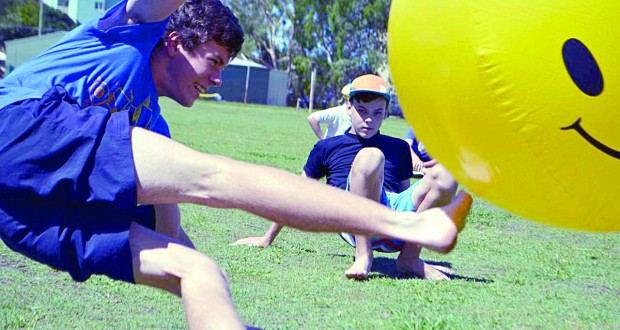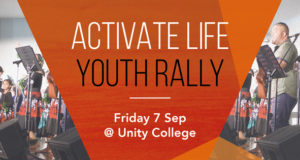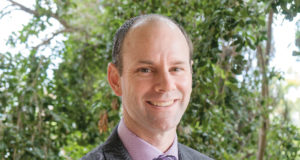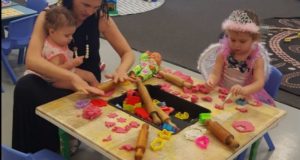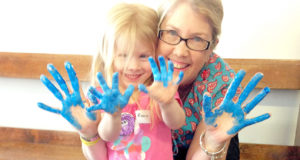Remember looking up at the stars at midnight, talking about God and faith and wishing that you could always hold worship in a bush chapel or on the beach at dawn? Dianne Jensen finds out why youth camps still play a pivotal role in faith development.
Youth camps are a tradition in the Uniting Church, drawing on the legacy of the Methodist, Presbyterian and Congregational traditions. You can’t turn around in most churches without bumping into someone over the age of 30 years who made their faith commitment through camps—and possibly met their spouse at the same time.
Recent research commissioned by the Christian Venues Association has backed up the anecdotal evidence that youth camps play a pivotal role in spiritual development and faith commitment. Social shifts, spiritual trends: Four decades of change revealed that over a quarter of church attenders make their first faith decision in the key youth years (10–19 years). One in ten attenders cited church camps as a significant factor in helping them come to faith, rising to 28.7 per cent of current 15-29 year olds.
“Whilst traditional ways of people engaging with Christianity in our community are declining, the role of other activities, such as youth groups and camps, seem to be having an increased prominence and impact in faith decisions for these younger generations,” says the report.
“In a post-Christian, missional context that Australia is now in, the need to actively engage young people in helping them come to faith is pertinent for the future of the church.”
Christian think tank Here2Stay backs up this data, nominating “peak experiences” such as camping as one of the top ten formational pillars in faith development. Many of us—regardless of age—will remember those moments of revelation and shared experience as turning points in our lives.
“A peak experience can be a planned event that becomes a wonderful and positive encounter with God. A peak experience can also be unplanned, a place where God shows up and something happens that grows and challenges you in your faith journey,” says Here2Stay.
Asking the God questions
Camping veteran Rev Beth Nicholls, project officer at the Presbytery of South Moreton, began teaching craft at children’s camps when she was a teenager. She has led camps across Queensland for 35 years, including Redlands Uniting Churches Go West day camps in rural communities.
“I have always known that camping is one way of building relationships with kids and helping them to hang in there until their faith kicks in,” says Beth.
“It’s an opportunity to engage faith in an intentional way, and you can build a relationship. Whether it is a live-in or a day camp, you’ve got their undivided attention and the space and place to be able to actually ask the ‘God questions.’ ”
Ian Edgar, manager of the Uniting Church Alex Park Conference Centre on the Sunshine Coast and chair of the Christian Venues Association Queensland region, has seen many teenagers attend camp as participants and return to take on leadership roles.
He estimates that about two thirds of the Uniting Church people who attend Synod have had a spiritual experience through youth camp.
“There is some really significant data for the church to consider about where they focus their ministry. If we go to a generation that doesn’t have that camp experience, are we going to lose those decision points in young people’s lives when they can get away, have time to reflect and have time to share with their peers?”
Outside the comfort zone
Eliza Childs from Cleveland Uniting Church, a 20-year-old currently doing her teaching prac in Roma, has connected with young people across rural Queensland through her participation in Go West camps.
“You form close bonds with people who you are working with, have a lot of fun together, and make some fantastic memories,” says Eliza. “I think it definitely widened my experience, being with other people who have those same values, and being able to share with the children about our faith.”
Being away from parents and school and being part of a dedicated team is an important part of the camp experience, she adds.
“When we went to Mundubbera, we would have devotions in the morning and afternoon, setting the purpose for the day—instilling the idea that our work is our worship, trying to live your faith in everything you do during your time there.”
Changing hearts and minds
Since 2008, Summer Madness events have brought the camping experience to a new generation.
Rev Alison Cox, children, youth and families coordinator at Moreton Rivers Presbytery says a Synod-wide event is one of the rare times where young people and youth leaders from across the state come together.
“One of the key focus areas has been about inclusion, and particularly honouring the relationship with our Indigenous brothers and sisters, and this has really enhanced the whole event. It changes people’s hearts and minds and makes them live in that camp community differently—and in their own communities when they go back home.
“We have been really intentional about asking congregations to invest in their young people, not just by sending them but by coming with them. We have home group time each day, so even if you don’t see your young people during the day because they are off having a great time with everyone else, there’s this moment to re-connect each night that allows them that space to talk about what’s been happening, what’s changing, where have they seen God … that’s where those beautiful conversations which are vital and life-giving and faith-giving to young people happen.”
The camping ministry is an opportunity for congregations to sponsor young people from other churches doing it tough, she adds.
“In those regional communities where cost is usually the prohibitive factor—it’s not that the kids don’t want to come or that the leaders don’t want to come—but there’s no cash available to do the extras. If a church that doesn’t have young people has the ability to share, that would be incredible and such a blessing for the whole church.”
Preparations are underway for a new Synod-wide youth event in Easter 2016.
Getting it right
No one wants their youth camp to be memorable for all the wrong reasons, so what’s the secret of a great youth camp?
Careful planning and strong leadership are important, says Beth Nicholls, and food is a key thing to get right.
“A camp runs on its stomach. And proper planning will allow you to be spontaneous, having everything organised beforehand. I am also conscious that the young people who come on camp, it’s their holiday, so you need a leadership team that will actually work together to make the experience as special as it can be.”
Eliza Childs suggests that with younger campers it is important to link the adventurous with the spiritual.
“Having the balance between the faith aspects and the activities that draw kids in and give them those different experiences like archery and orienteering … and helping them to connect the two, so they can pray for a safe day and look after each other as a team.”
Everyone agrees that the heart of the camping experience has always been about providing space to think about God, the universe and everything—and nurturing that spark of faith when it flares into existence.
“We know how vital youth camps are in terms of faith formation, and there are a thousand reasons for that, from the community to the hype to the lack of sleep,” says Alison Cox. “We have got to keep providing those opportunities for kids to meet with God and each other beyond their local setting.”
 JourneyOnline
JourneyOnline
